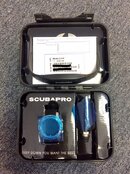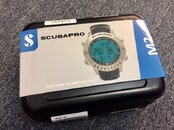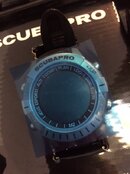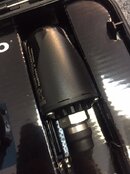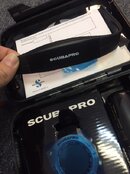KelnKelp
Registered
Selling, brand new, never taken out of the box ScubaPro Mantis M2 dive computer. This includes the wireless air transmitter and the heartrate strap. Brand new, received as replacement for a different computer that was no longer supported, but its not the computer I'd like to use.
Sells online for $1,200-1,500. Looking for $900. I'll ship free (USPS) within the USA, paypal fees included in total price. Available for local pickup in Los Angeles, CA.
-----------------------------
About the watch: http://www.scubapro.com/en-US/USA/instruments/computers/products/m2.aspx
Technical Information
Personalization Features
Adaptive Algorithm
All dive computer algorithms factor in depth, bottom time and gas mix to calculate deco time. However, SCUBAPRO's ZHL-8 ADT MB PMG is the only dive computer algorithm that includes a diver's breathing rate, heart rate and skin temperature as an indicator of workload during a dive and adjusts the decompression plan to avoid risk factors.
Microbubble Settings
These enable the adaptive algorithm to adjust for each diver's experience level, age and physical conditioning. Choosing a microbubble level between L0-L5 allows you either take up less nitrogen or off-gas more quickly.
Heart Rate Monitor
By visually monitoring your heart rate you can better assess your workload -- real time -- and promptly react to heightened stress or over-exertion. At the same time, the dive computer incorporates this information into its workload calculation, adjusting the algorithm to make the dive safer. On a less critical level, measuring your heart rate also lets you focus on increasing your endurance training, which allows you to transform your love of diving into a fitness sport.
Skin Temperature Monitor
This patent-pending feature provides yet another aspect of your physiology that can be factored into the workload algorithm. Extreme cold can affect a diver's ability to off-gas nitrogen. This additional information lets your algorithm update its decompression calculations to improve the diving experience.
Profile Dependent Intermediate Stops (PDIS)
Calculates an intermediate stop based on how much nitrogen the body has absorbed, taking into account the current dive, previous dives and breathing mixes
Stroke Counter
Can be a valuable aid when exercising or lap swimming in shallow water. By keeping track of strokes you can also calculate distance.
Calorie Burning
Can be calculated by combining heart rate and workload data. In today's fit-conscious society you'd be hard-pressed to find anyone not interested in how many calories were burned over the course of the day's dive. (The Calorie Tracker is available when using LogTRAK software.)
Sells online for $1,200-1,500. Looking for $900. I'll ship free (USPS) within the USA, paypal fees included in total price. Available for local pickup in Los Angeles, CA.
-----------------------------
About the watch: http://www.scubapro.com/en-US/USA/instruments/computers/products/m2.aspx
Technical Information
- Human Factor Diving™ is SCUBAPRO's revolutionary new approach to product development that combines Human Factors Engineering, biometrics and wearable technology to create cutting-edge high-tech self-tracking devices that make diving safer and more fun.
- Targeted to recreational and technical divers as well as CCR divers and freedivers.
- Predictive Multi-Gas ZHL8 ADT MB algorithm accommodates three gas mixes (21-100% O2).
- PDIS (Profile Dependent Intermediate Stops) calculates an intermediate stop based on N2 loading, current and previous dives and breathing mixes for safer diving.
- Microbubble levels let you adjust the level of conservatism in the algorithm to match your experience level, age and physical conditioning.
- Smart technology hoseless air integration handles multiple transmitters.
- Heart rate monitor records heartbeat and skin temperature (with SCUBAPRO HRM Belt only) that can be factored into the decompression calculation along with workload.
- Digital tilt-compensated on-board compass allows for easy navigation.
- Casing is built from the highest marine grade 316L stainless steel with a two-toned brushed finish that protects and looks great.
- Control buttons are assembled in modules using triple O-rings to maintain the casing's watertight integrity.
- Great for freediving.
- Programs three gas mixes (21- 100% O2).
- Four Dive modes: Scuba, Gauge, Freediving and CCR.
- Swim mode.
- Sport mode.
- Full topside time-keeping functions.
- Chronograph with lap memory for running.
- Fixed PPO2 CCR algorithm.
- Visually pleasing segmented LCD display.
- Protective mineral glass.
- Easy-to-read characters and graphics.
- Intuitive menu.
- Simple circular navigation system.
- Enhanced logbook for freediving.
- Maximum operating depth: 394ft/120m.
- CR2450 dealer replaceable battery rated for two years/300 dives.
- PC and Mac compatible using LogTRAK.
- Colored bands sold separately.
Personalization Features
Adaptive Algorithm
All dive computer algorithms factor in depth, bottom time and gas mix to calculate deco time. However, SCUBAPRO's ZHL-8 ADT MB PMG is the only dive computer algorithm that includes a diver's breathing rate, heart rate and skin temperature as an indicator of workload during a dive and adjusts the decompression plan to avoid risk factors.
Microbubble Settings
These enable the adaptive algorithm to adjust for each diver's experience level, age and physical conditioning. Choosing a microbubble level between L0-L5 allows you either take up less nitrogen or off-gas more quickly.
Heart Rate Monitor
By visually monitoring your heart rate you can better assess your workload -- real time -- and promptly react to heightened stress or over-exertion. At the same time, the dive computer incorporates this information into its workload calculation, adjusting the algorithm to make the dive safer. On a less critical level, measuring your heart rate also lets you focus on increasing your endurance training, which allows you to transform your love of diving into a fitness sport.
Skin Temperature Monitor
This patent-pending feature provides yet another aspect of your physiology that can be factored into the workload algorithm. Extreme cold can affect a diver's ability to off-gas nitrogen. This additional information lets your algorithm update its decompression calculations to improve the diving experience.
Profile Dependent Intermediate Stops (PDIS)
Calculates an intermediate stop based on how much nitrogen the body has absorbed, taking into account the current dive, previous dives and breathing mixes
Stroke Counter
Can be a valuable aid when exercising or lap swimming in shallow water. By keeping track of strokes you can also calculate distance.
Calorie Burning
Can be calculated by combining heart rate and workload data. In today's fit-conscious society you'd be hard-pressed to find anyone not interested in how many calories were burned over the course of the day's dive. (The Calorie Tracker is available when using LogTRAK software.)




